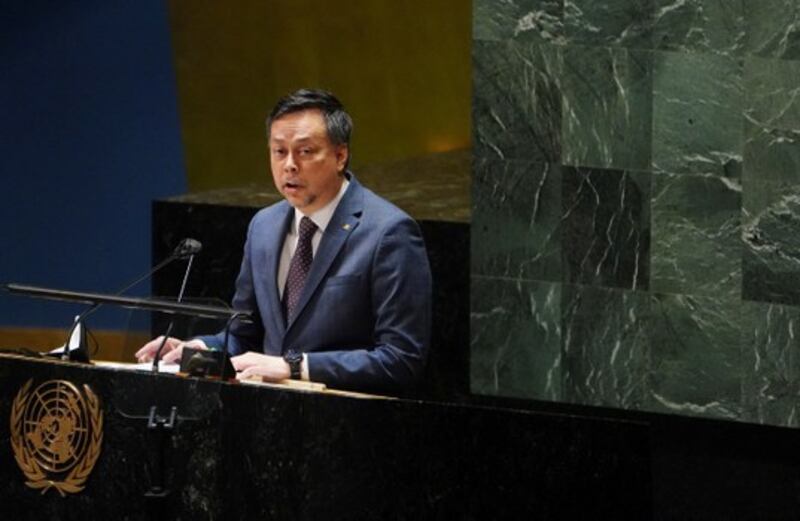A new ASEAN statement about the situation in Ukraine calls for a ceasefire without naming Russia or using the word “invasion” – in puzzling contrast to most of the bloc’s members supporting a strongly worded U.N. resolution that condemned Moscow the day before.
The foreign ministers of the Association of Southeast Asian Nations (ASEAN), in the collective statement they issued on Thursday, said they were deeply troubled by the intensifying gravity of the situation resulting from the “military hostilities” in Ukraine.
"We therefore, call for an immediate ceasefire or armistice and continuation of political dialogues that would lead to sustainable peace in Ukraine," the statement said.
“We underline the importance of a ceasefire to create an enabling environment for negotiations to address the current crisis and avoid expanding suffering of innocent people.”
By contrast, the U.N. General Assembly resolution "deplored" the aggression by Russia against Ukraine.
The General Assembly “demands that the Russian Federation immediately cease its use of force against Ukraine and to refrain from any further unlawful threat or use of force against any member state,” the resolution said.
It “also demands that the Russian Federation immediately, completely and unconditionally withdraw all of its military forces from the territory of Ukraine within its internationally recognized borders,” the resolution added.
General Assembly resolutions, though non-binding, have political heft and reflect international opinion. So the fact that 141 of the assembly's 193 member-nations supported the resolution means showed there is overwhelming support for Ukraine worldwide.

‘Statement on Ukraine invasion was weak’
In Southeast Asia, too, there was similar overwhelming support for the former Soviet republic as eight of 10 ASEAN countries voted in favor of the forcefully worded U.N. resolution, even though the regional bloc itself issued what one political analyst called a “weak” statement.
Among the ASEAN member-states, Vietnam and Laos abstained from voting in favor of the resolution. In ASEAN, Vietnam has the strongest historical ties with Russia. Laos also has had a close relationship with what was the Soviet Union and has been expanding military ties with Russia.
But Southeast Asian nations such as Malaysia, Thailand and Cambodia, which individually did not condemn Russia, voted in favor of the strong U.N. resolution. The Myanmar ambassador to the U.N. was among those voting for the resolution, but he opposes Myanmar’s junta, which has voiced support for the Russian invasion.
In Thailand, apparently, Prime Minister Prayuth Chan-o-cha told the cabinet on Tuesday that the kingdom would be neutral in the Russia-Ukraine affair, because the longstanding relations between Thailand and Moscow must be factored in, a source told The Bangkok Post.
Therefore, not surprisingly, Thailand’s statement at the U.N. did not mention Russia or “invasion,” and yet Thailand did vote for the resolution condemning Russia.
But the statement by Suriya Chindawongse, permanent representative of Thailand to the U.N., said Thailand was gravely concerned with the worsening violence as a result of “the use of military force in Ukraine.”
Also, the kingdom has “particular respect for the sovereignty, territorial integrity and political independence of states, and refraining from the use of force or threat of use of force against another state,” he said.
Similarly, Malaysia, which had until two days ago not condemned Russia or even mentioned it by name in its statements at home, voted in favor of the U.N. resolution in New York, saying the principles of sovereignty, independence and territorial integrity of states were “sacrosanct” to the country.
And yet, it also said that it had “strong and close relations” with both Russia and Ukraine.
Cambodia, ASEAN’s chair this year, also had said at home that it was staying neutral, but voted for the U.N. resolution noting that its “firm position” was that U.N. member-states “must respect the sovereignty, territorial integrity and political independence of other member states.”
“ASEAN statement on Ukraine invasion was weak, as were most national responses apart from Singapore,” Ben Bland, director of the Southeast Asia program at the Lowy Institute, a Sydney think-tank, said on Twitter.
On Monday, Singapore broke from ASEAN’s line by saying it would impose sanctions on Russia and suspend exports of items that could be used as weapons in Ukraine, as well as block some banking and financial transactions linked to Russia.
Analysts called the city-state’s move unprecedented.
As for ASEAN’s statements, Phil Robertson, deputy Asia director of Human Rights Watch, said on Twitter that their “real value …is …[they] allow … its members to duck and hide, and avoid taking a stand on sensitive issues.”
BenarNews is an RFA-affiliated online news service.
